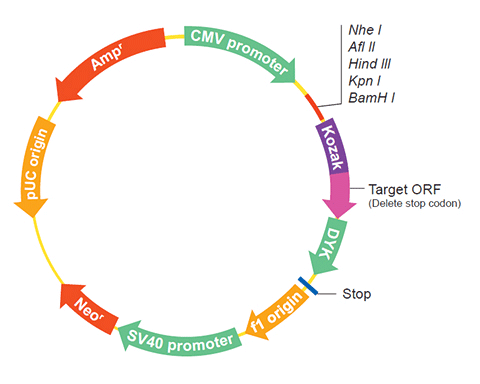| Gene Symbol | PCDHGC5 |
| Entrez Gene ID | 100034697 |
| Full Name | protocadherin gamma subfamily C, 5 |
| Gene Type | protein-coding |
| Organism | Pan troglodytes(chimpanzee) |
HOME
ORF » Species Summary » Pan troglodytes » PCDHGC5 cDNA ORF clone
| Gene Symbol | PCDHGC5 |
| Entrez Gene ID | 100034697 |
| Full Name | protocadherin gamma subfamily C, 5 |
| Gene Type | protein-coding |
| Organism | Pan troglodytes(chimpanzee) |
| mRNA | Protein | Name |
|---|---|---|
| NM_001082558.2 | NP_001076027.1 | protocadherin gamma-C5 precursor |
| NM_001082558.3 | NP_001076027.1 | protocadherin gamma-C5 precursor |

| Pan troglodytes (chimpanzee) | PCDHGC5 | NP_001076027.1 |
| Rattus norvegicus (Norway rat) | Pcdhgc5 | NP_001157760.1 |
| Xenopus tropicalis (tropical clawed frog) | LOC101731155 | XP_004920709.1 |
| Xenopus tropicalis (tropical clawed frog) | LOC101731401 | XP_004913216.1 |
| Xenopus tropicalis (tropical clawed frog) | LOC101731088 | XP_004913212.1 |
| Xenopus tropicalis (tropical clawed frog) | LOC101731215 | XP_004913214.1 |
| Xenopus tropicalis (tropical clawed frog) | LOC101731510 | XP_004913218.1 |
| Xenopus tropicalis (tropical clawed frog) | LOC101731450 | XP_004913217.1 |
| LOC702071 | XP_002804588.1 | |
| Xenopus tropicalis (tropical clawed frog) | pcdhga11 | NP_001072371.1 |
| Xenopus tropicalis (tropical clawed frog) | LOC101731281 | XP_004913215.1 |
| Xenopus tropicalis (tropical clawed frog) | LOC101731572 | XP_004913219.1 |
| Homo sapiens (human) | PCDHGC5 | NP_061752.1 |
| Xenopus tropicalis (tropical clawed frog) | LOC101731879 | XP_004920870.1 |
| Xenopus tropicalis (tropical clawed frog) | LOC101731032 | XP_004913211.1 |
| Mus musculus (house mouse) | Pcdhgc5 | NP_291061.1 |
| Xenopus tropicalis (tropical clawed frog) | LOC100492310 | XP_002944383.2 |

Initial sequence of the chimpanzee genome and comparison with the human genome.
Nature437(7055)69-87(2005 Sep)
Comparative genomics and diversifying selection of the clustered vertebrate protocadherin genes.
Wu Q
Genetics169(4)2179-88(2005 Apr)
GeneRIFs: Gene References Into Functions What's a GeneRIF?
The following PCDHGC5 gene cDNA ORF clone sequences were retrieved from the NCBI Reference Sequence Database (RefSeq). These sequences represent the protein coding region of the PCDHGC5 cDNA ORF which is encoded by the open reading frame (ORF) sequence. ORF sequences can be delivered in our standard vector, pcDNA3.1+/C-(K)DYK or the vector of your choice as an expression/transfection-ready ORF clone. Not the clone you want? Click here to find your clone.
| CloneID | OPc00308 | |
| Clone ID Related Accession (Same CDS sequence) | NM_001082558.2 , NM_001082558.3 | |
| Accession Version | NM_001082558.2 | Documents for ORF clone product in default vector |
| Sequence Information | ORF Nucleotide Sequence (Length: 2835bp) Protein sequence SNP |
|
| Vector | pcDNA3.1-C-(k)DYK or customized vector |  User Manual User Manual |
| Clone information | Clone Map |  MSDS MSDS |
| Tag on pcDNA3.1+/C-(K)DYK | C terminal DYKDDDDK tags | |
| ORF Insert Method | CloneEZ™ Seamless cloning technology | |
| Insert Structure | linear | |
| Update Date | 2017-11-09 | |
| Organism | Pan troglodytes(chimpanzee) | |
| Product | protocadherin gamma-C5 precursor | |
| Comment | Comment: PROVISIONAL REFSEQ: This record has not yet been subject to final NCBI review. The reference sequence was derived from AACZ04059174.1. On Jul 14, 2016 this sequence version replaced NM_001082558.1. Sequence Note: The RefSeq transcript and protein were derived from genomic sequence to make the sequence consistent with the reference genome assembly. The genomic coordinates used for the transcript record were based on alignments. ##Evidence-Data-START## Transcript exon combination :: GABE01002109.1 [ECO:0000332] RNAseq introns :: single sample supports all introns SAMN01120800, SAMN01120804 [ECO:0000348] ##Evidence-Data-END## | |
1 | ATGGGGCCCA AGACACTCCC ACAGCTCGCT GGGAAATGGC AAGTGCTGTG CATGTTGTCC |
The stop codons will be deleted if pcDNA3.1+/C-(K)DYK vector is selected.
| RefSeq | NP_001076027.1 |
| CDS | 227..3061 |
| Translation |

Target ORF information:
Target ORF information:
|
 NM_001082558.2 NM_001082558.2 |

1 | ATGGGGCCCA AGACACTCCC ACAGCTCGCT GGGAAATGGC AAGTGCTGTG CATGTTGTCC |
The stop codons will be deleted if pcDNA3.1+/C-(K)DYK vector is selected.
| CloneID | OPc00308 | |
| Clone ID Related Accession (Same CDS sequence) | NM_001082558.2 , NM_001082558.3 | |
| Accession Version | NM_001082558.3 Latest version! | Documents for ORF clone product in default vector |
| Sequence Information | ORF Nucleotide Sequence (Length: 2835bp) Protein sequence SNP |
|
| Vector | pcDNA3.1-C-(k)DYK or customized vector |  User Manual User Manual |
| Clone information | Clone Map |  MSDS MSDS |
| Tag on pcDNA3.1+/C-(K)DYK | C terminal DYKDDDDK tags | |
| ORF Insert Method | CloneEZ™ Seamless cloning technology | |
| Insert Structure | linear | |
| Update Date | 2019-03-20 | |
| Organism | Pan troglodytes(chimpanzee) | |
| Product | protocadherin gamma-C5 precursor | |
| Comment | Comment: PROVISIONAL REFSEQ: This record has not yet been subject to final NCBI review. The reference sequence was derived from NBAG03000455.1 and NBAG03000228.1. On Jul 23, 2018 this sequence version replaced NM_001082558.2. Sequence Note: The RefSeq transcript and protein were derived from genomic sequence to make the sequence consistent with the reference genome assembly. The genomic coordinates used for the transcript record were based on alignments. ##Evidence-Data-START## Transcript exon combination :: GABE01002109.1 [ECO:0000332] RNAseq introns :: single sample supports all introns SAMN01120800, SAMN01120804 [ECO:0000348] ##Evidence-Data-END## | |
1 | ATGGGGCCCA AGACACTCCC ACAGCTCGCT GGGAAATGGC AAGTGCTGTG CATGTTGTCC |
The stop codons will be deleted if pcDNA3.1+/C-(K)DYK vector is selected.
| RefSeq | NP_001076027.1 |
| CDS | 227..3061 |
| Translation |

Target ORF information:
Target ORF information:
|
 NM_001082558.3 NM_001082558.3 |

1 | ATGGGGCCCA AGACACTCCC ACAGCTCGCT GGGAAATGGC AAGTGCTGTG CATGTTGTCC |
The stop codons will be deleted if pcDNA3.1+/C-(K)DYK vector is selected.
Initial sequence of the chimpanzee genome and comparison with the human genome. |
Comparative genomics and diversifying selection of the clustered vertebrate protocadherin genes. |